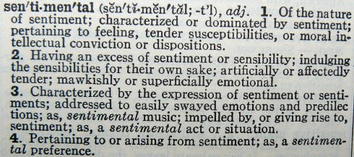Visitors to these pages (that may only be me) will have spotted various posts that excoriate sentimentality. It is a fake and devaluing response to the challenges of life. It is rife. And so I was glad to come across this in Roger Scruton's 'Confessions of a Heretic':
The Czech novelist Milan Kundera made a famous observation. 'Kitsch,' he wrote, 'causes two tears to flow in quick succession. The first tear says: How nice to see children running on the grass! The second tear says: how nice to be moved, together with all mankind, by children running on the grass!' Kitsch, in other words, is not about the thing observed but about the observer. It does not invite you to feel moved by the doll you are dressing so tenderly, but by yourself dressing the doll. All sentimentality is like this: it redirects emotion from the object to the subject, so as to create a fantasy of emotion without the real cost of feeling it. The kitsch object encourages you to think, 'look at me feeling this; how nice I am and how lovable'. That is why Oscar Wilde, referring to one of Dickens's most sickly death-scenes, said that 'a man must have a heart of stone not to laugh at the death of Little Nell'.
